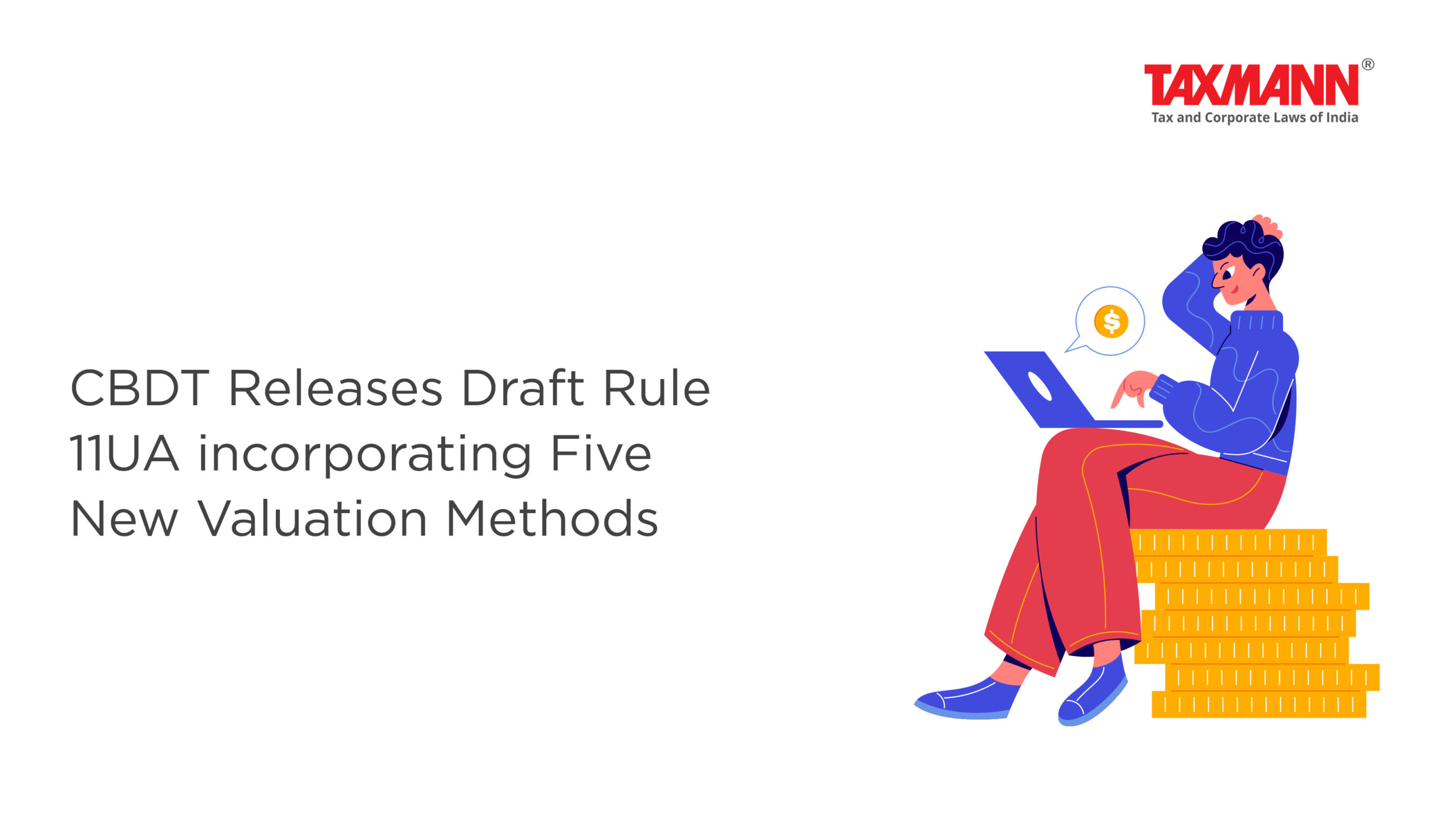CBDT Releases Draft Rule 11UA incorporating Five New Valuation Methods
- Blog|News|Income Tax|
- 2 Min Read
- By Taxmann
- |
- Last Updated on 29 May, 2023

Notification F. No. 370142/9/2023, dated 26-05-2023
The Finance Act, 2023, amended section 56(2)(viib) to bring into account the consideration received from non-residents for the issue of shares. The section provides that if the consideration for the issue of shares exceeds the Fair Market Value (FMV) of the shares, it shall be chargeable to income tax under the head’ Income from other sources’. Rule 11UA prescribes the manner to compute FMV of such shares.
Pursuant to the Finance Act 2023 amendment, the Central Board of Direct Taxes (CBDT) has released a notification proposing an amendment to Rule 11UA. The CBDT has requested the stakeholders as well as the general public to provide suggestions/comments on the draft Rule 11UA and send them at the email address ustpI2@nic.in latest by 5th June, 2023.
The changes proposed in the draft rule are mentioned below:
1) 5 new valuation methods for non-resident investors
The draft rule introduced the following five new methods for the computation of the fair market value of the unquoted shares determined by the merchant banker:
(a) Comparable Company Multiple Method;
(b) Probability Weighted Expected Return Method;
(c) Option Pricing Method;
(d) Milestone Analysis Method; and
(e) Replacement Cost Methods.
These new methods can be used only to determine FMV of shares issued to non-resident investors.
2) The price at which shares are issued to the notified entity can be treated as FMV for others
It has been proposed that if a company receives any consideration for the issue of shares from notified entity, the price of the equity shares corresponding to such consideration, may be taken as the FMV of the equity shares for other investors.
However, the following two conditions must be satisfied:
(a) The above benchmarking applies only to the extent of aggregate consideration that is received from the notified entity; and
(b) The company has received the consideration from the notified entity within 90 days of the date of the issue of shares which are the subject matter of valuation.
On similar lines, venture capital undertaking can use the price of equity shares issued to a venture capital fund, venture capital company or specified fund.
For example, if a venture capital undertaking receives a consideration of Rs 50000 from a venture capital company for the issue of 100 shares at the rate of Rs. 500 per share, then such an undertaking can issue 100 shares at this rate to any other investor within 90 days of the receipt of consideration from venture capital company.
3) Merchant Banker’s report shouldn’t be older than 90 days
Draft sub-rule (3) proposed that the valuation report by the Merchant Banker would be acceptable if it is of a date not more than 90 days prior to the date of issue of shares which are the subject matter of valuation.
4) 10% Safe harbor limit introduced
Sub-rule (4) has provided a safe harbor limit of 10%.
This means that if the price at which shares are issued is higher than the value determined per Rule 11UA, but the difference doesn’t exceed 10%, the issue price will be held as the fair market value.
Click Here To Read The Full Notification
Disclaimer: The content/information published on the website is only for general information of the user and shall not be construed as legal advice. While the Taxmann has exercised reasonable efforts to ensure the veracity of information/content published, Taxmann shall be under no liability in any manner whatsoever for incorrect information, if any.

Taxmann Publications has a dedicated in-house Research & Editorial Team. This team consists of a team of Chartered Accountants, Company Secretaries, and Lawyers. This team works under the guidance and supervision of editor-in-chief Mr Rakesh Bhargava.
The Research and Editorial Team is responsible for developing reliable and accurate content for the readers. The team follows the six-sigma approach to achieve the benchmark of zero error in its publications and research platforms. The team ensures that the following publication guidelines are thoroughly followed while developing the content:
- The statutory material is obtained only from the authorized and reliable sources
- All the latest developments in the judicial and legislative fields are covered
- Prepare the analytical write-ups on current, controversial, and important issues to help the readers to understand the concept and its implications
- Every content published by Taxmann is complete, accurate and lucid
- All evidence-based statements are supported with proper reference to Section, Circular No., Notification No. or citations
- The golden rules of grammar, style and consistency are thoroughly followed
- Font and size that’s easy to read and remain consistent across all imprint and digital publications are applied



 CA | CS | CMA
CA | CS | CMA
